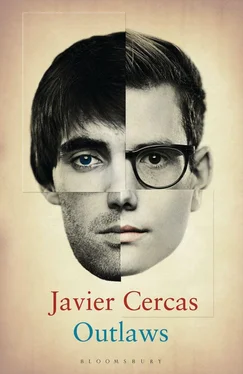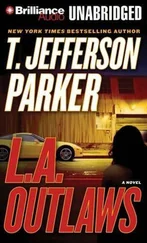‘The General looked at Zarco with distrust, but soon followed him, just as Tere, Guille and I did; then his wife followed. For quite a long time the General was examining the stuff, crouched down, with his wife standing beside him: he’d pick something up, describe it, list its defects (many, according to him) and virtues (according to him, few) and then he’d move on to the next. As I watched the scene I understood that the General was listing and describing more for his wife than for himself, and for a moment I thought his wife had trouble with her eyesight or that she was actually blind. When they finished the inventory and valuation, the General and his wife moved a few steps away, exchanged a few inaudible words and soon the man returned, crouched down again beside the Telefunken television set, passed his hand over the screen as if he wanted to get the dust off it, pressed the on-off button a couple of times to no effect and asked: How much do you want? Double, answered Zarco without a thought. Double what? asked the General. Double what you paid those dupes, answered Zarco. This time it was the General who smiled. Then he placed his hands on his knees, stood up with a groan and looked his wife in the eye; his wife didn’t look at him; she was staring beyond the fences of the yard, as if something in the sky had caught her attention. The General looked at the empty sky and then looked back at Zarco. I’ll give you sixteen thousand, he said. Zarco pretended to think it over for a moment before turning to me. Hey, Gafitas, he said. You’ve been to school: is sixteen thousand double fourteen thousand? I shook my head slightly and Zarco turned back to the General and copied my gesture. You’re crazy, said the General without the smile leaving his face. I’m making you a good offer. It doesn’t seem that good to me, said Zarco. Nobody’s going to pay what you’re asking, insisted the General. We’ll see about that, replied Zarco. He immediately signalled to Guille and the two of them picked up the television while I carried the record player and Tere the speakers, but we hadn’t even started walking when we saw that the General’s wife was waiting for us at the door to the house, as if she wanted to say goodbye or rather as if she wanted to prevent us from leaving. Twenty thousand, the General said then. Carrying the television, Zarco looked at him, looked at his wife, looked at me and asked: Is twenty thousand double fourteen thousand? Before I could answer, the General said: Twenty-three thousand. It’s my final offer. Then Zarco gestured to Guille that they should put the television down and, once they’d done so, went over to the General, held out his hand and said: Twenty-five thousand and there’s no more to be said.
‘Nothing more was said: the General reluctantly accepted the deal and paid us the twenty-five thousand pesetas in thousand-peso notes.’
‘Zarco twisted his arm.’
‘That’s what it seemed like, that’s what I thought that day, but I don’t believe it: what we’d stolen was surely worth a lot more than that; otherwise the General wouldn’t have paid what he paid. He was smart, and his wife was even smarter. They always seemed to give ground, but they never actually did, or at least they never lost out; when I think about it, the very opposite happened to Zarco, and not only with the General and his wife: although he sometimes seemed to win, he always ended up losing. Of course it took me a long time to understand that. The first time I saw him, at the Vilaró arcade, Zarco seemed to me like one of those unpredictable, violent, tough guys who inspire fear because they feel no fear, exactly the opposite of what I was or how I felt then: I felt like a born loser, so he could only be a born winner, a guy who was going to conquer the world; that’s what I think Zarco was to me, and maybe not just for that summer. As I said, it took me a long time to figure out that he was actually a born loser, and when I did figure it out it was too late and the world had already conquered him. . Anyway. I just remembered a story. It doesn’t have to do directly with Zarco, but indirectly it does. Or at least I feel it has to do with him.’
‘Go ahead.’
‘Tere told the story, I don’t remember when or where. In any case it was one of many I heard about the prefabs, something they talked a lot about in Zarco’s gang, as if they were all really proud of having lived there or as if having lived there was the only thing that really united them. It had happened some eight years earlier, before Zarco lived in the prefabs but when the rest of them did, and so, some more and some less, they all remembered it or had heard it told. The story had started the day a man caught his wife in bed with the next-door neighbour; according to Tere’s version, the man was a good man, but the neighbour was an awful brute who’d been making his life impossible for years. And so, when the good man saw that his wife was cheating on him, and who she was cheating with, he freaked out and ended up setting fire to the place next door. The problem was that this happened in the wooden prefabs (housing that, as Tere pointed out, no longer existed), and the flames spread very quickly and the fire ended up devouring thirty-two homes. It was a dramatic story, which had apparently caused the worst disaster in the whole history of the prefabs, but Tere told it as if it were a comical story or we’d all smoked so much hash and drunk so many beers and popped so many pills that we listened to it as if it were a comical story, laughing till tears were streaming down our faces, interrupting her constantly. Anyway, what I remember most clearly isn’t the story itself but what happened after Tere finished telling it. I asked how it had ended for the two protagonists. That’s the best part of the story, interrupted Guille, who never let an opportunity for sarcasm pass him by. In the end the bastard got off and the cheated-on husband owned up. Poor sucker got at least a couple of years in the can. We all laughed again, even harder. It’s what always happens, man, Gordo philosophized, suddenly serious, patting his lacquered shoulder-length hair. The good guys lose and the bad guys win. Don’t be a wanker, Gordo, Zarco leapt in. That’s what happens when the good guys are dickheads and the bad guys are smart. Oh man, Tío then burst in, with an innocence that for a moment I interpreted as a form of irony. Don’t fucking tell me that now you want to be a good guy? Zarco seemed doubtful, seemed to think over his reply or to realize all of a sudden that we were all waiting for his reply and had stopped laughing. Of course, don’t you? he finally said. But I’d rather be a bad guy than a dickhead. A wave of laughter met Zarco’s reply. And that’s where we left it.’
‘Are you telling me that, as well as a born winner, during that summer you saw Zarco as a good guy turned by circumstances into an arsonist?’
‘No. I’ve just told you a small story that forms part of a larger story; take it however you like, but not before I finish telling the whole story. Remember: facts, not explanations; ask me to tell you things, not interpret them.’
‘OK. Tell me then. You said that the General gave you twenty-five thousand pesetas for what you’d stolen in La Montgoda. That was quite a lot of money back then. What did you do with it?’
‘We spent it immediately. That’s what we always did. Money burned holes in our pockets: one afternoon we’d have twenty-five, thirty, forty thousand pesetas, and the next morning we’d have nothing left. That was normal for us. Of course we all spent the money and not just the ones who’d participated in the theft.’
‘When you say all you mean the whole gang?’
‘Yeah.’
‘That was the norm? Everything they stole got divvied up in equal portions?’
Читать дальше












